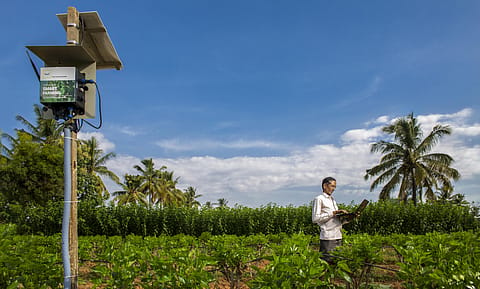Budget 2022: Agritech boost to fuel farmers' aspirations
Union Budget 2022-23’s agriculture-related policies could certainly be a game-changer for the agriculture sector if implemented well.

Promoting chemical-free farming, especially for farmers whose lands are close to the river Ganga, delivery of hi-tech digital services to farmers, use of drones to aid farmers, and last but not least, the impetus to agritech startups — Union Budget 2022-23’s agri-related policies could certainly be a game-changer for the agriculture sector if implemented in the right spirits. The step towards digitising land records, according to experts, could significantly help in linking farmers to a lot of businesses, which would mean additional incomes.
Farm technology and mechanisation aren’t really new to Indian farmers. Visit any moderately well-to-do farmer in rural India, he is quite aware of of agritech platforms. Be it weather-related information, knowledge on pesticides or soil testing, thanks to the inroads of internet, Indian farmers have started embracing technology.
Offering them these services are not only a host of agri start-ups such as Gramophone, AgNext or Krishi Network, even large corporates such as Mahindra, Godrej, Cisco and Microsoft have made inroads into it. The government’s intent to boost agri-related technology would give further impetus to the industry, say its stakeholders.
The Union Budget says that the country’s agriculture universities would be revising their curriculum to incorporate courses that would focus on sustainable agriculture, low-cost farming and organic farming.
“The decision to revise syllabi of agricultural universities, and use of Kisan drones for crop assessment, digitisation of land records, spraying of insect pesticides is a step in the right direction to modernise the agriculture sector,” says Balram Yadav, MD, Godrej Agrovet.
“Agriculture can be transformed with the use of technology and by using sustainable agricultural practices. It will improve farmer income and reduce inefficiencies,” adds Anjali Bansal, Founder, Avana Capital.
How could a drone help an Indian farmer assess his crop? “A specialised drone for a small farm will be able to exactly tell the farmer the areas of his farm which require more pesticide. This information is valuable as the farmer needn’t spray pesticide on the entire crop. This will help the farmer reduce inefficiencies as well as costs,” explains Siddhant Bhomia, co-founder and chief business officer, Krishi Network.
According to Taranjeet Singh Bhamra, founder and CEO, AgNext Technologies, the support extended by the government to agritech start-ups will provide the much-needed growth that the Indian agriculture sector needs. “The start-ups will come up with more innovative solutions and ensure faster delivery on the ground. This will boost exports too.”
Madan Sabnavis, chief economist at Care Ratings, agrees that the agriculture policies are indeed forward looking, but he isn’t sure whether it would help marginal farmers. “Be it focus on drones or organic farming, these make more sense for the rich farmers. We can’t forget the fact the bulk of India farmers are marginalised.”
Corporate interest
However, corporates such as Mahindra & Mahindra claim that their farm service business seeks to improve the per acre income of farmers and is certainly not focused on rich farmers. Ramesh Ramachandran, senior vice-president (Farming as a Service), Mahindra & Mahindra, in a recent interview with Fortune India had said that there have been 600,000 downloads of their recently launched Krish-e app and over 200,000 farmers have seen an improvement in their income per acre of land.
(INR CR)
The tractor manufacturer in the past few years has been encouraging consumers to not just invest in tractors but also other farm mechanisation products such as rice transplanters and laser land developers. Since each of these products cost a few lakhs, the company has introduced a rental model.
Cisco, on the other hand, has partnered with the Government of Kerala to bring in technology intervention that would prevent crop loss. In an earlier interview with Fortune India, Daisy Chittilapilly, President (India & SAARC), had said that she saw an opportunity in the agriculture sector and hence put out an agritech challenge. She asked participants to come up with tech solutions around agri income loss, crop loss, pest attacks and soil monitoring.
“This was particularly focused on the start-up ecosystem within the country. It could be a good way for them to get some support, but also get some visibility in terms of how they go about building their organisation, idea and the business as well. We have shortlisted six players as a part of that agritech challenge. And, there's a cash price announced as well,” said Chittilapilly.
The first-mover in investing in agriculture as a serious business is ITC, through its e-Choupal format. It has launched e-Choupal 4.0, wherein it is focusing on technology-related services. Not only are the 4 million farmers part of the e-Choupal network able to discover prices of agri-products digitally, they also have access to data on weather, potential pest attack threats and a bouquet of other tech services.